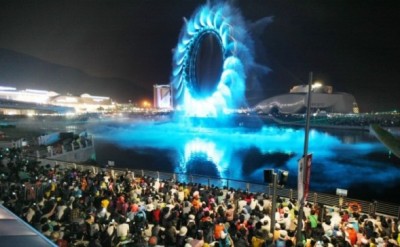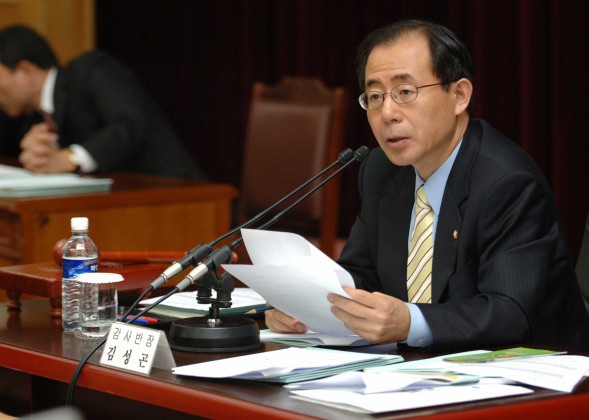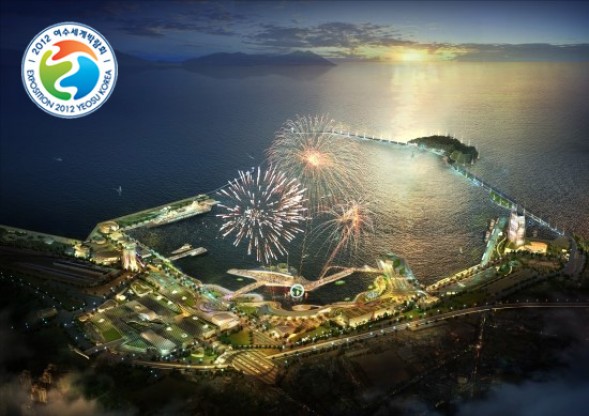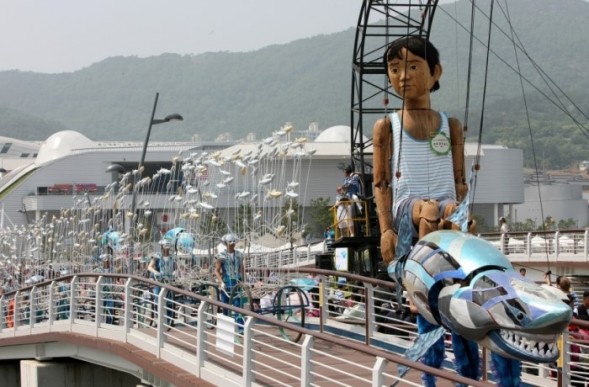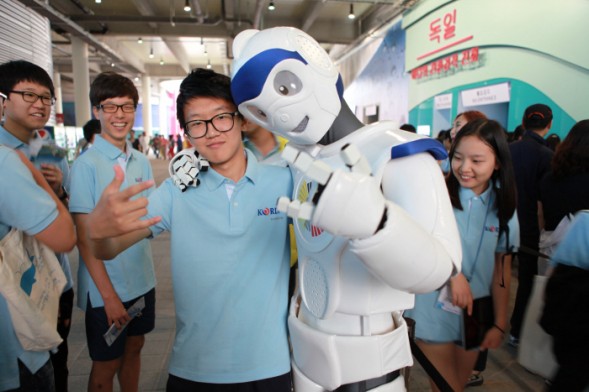Dr. Suggon Kim is a Korean national assembly member representing Yeosu, the beautiful city that is hosting the World Expo. He shares his thoughts about what it means to have the expo in his city and on Korean philosophy.
The Columnist (TC): Dr. Kim, what does hosting a World Expo mean for a city that once hosted the South Jeolla Province Navy Base?
Dr. Kim: In Chinese, Yeosu means beautiful sea. Yeosu is located in the center of the southern seashore along the Korean peninsula. A few years ago, the Korean government decided to develop a sightseeing belt on this southern seashore where Yeosu sits.
Yeosu is one of the most beautiful cities for ocean life so this was an incentive for us to invite the World Expo here. We failed years earlier in a bid for the World Expo against China but then we finally won for 2012 when we ran against Holland and Morocco.
Through this event, Korea wants to be seen as one of the nations with a strong ocean-oriented industry. Up until now, Korea has had no major ocean-industry initiative, or ocean environment, so we want to change this through the World Expo showcase.
If you look at the map, you may feel Korea is at the end of the giant Chinese landmass but we think in the reverse. We are not the small end of the Chinese landmass. Instead, we are at the starting point from which we may go to the Pacific and we are at the forefront.
In Korea, we have a theory of Ying and Yang which leads us to believe that the world is changing from a male-dominated period (YANG) to a female-dominated period (YING). One of reasons why women are assuming power internationally is because this is the Ying period according to the cyclometer. The Yang period, where man currently holds power, is represented by land continents. The Ying period is represented by ocean and water and it is the symbol of woman. We believe that with the emergence of this Ying period, water, woman, software will assume power while the Yang period, represented by man, continent and hardware, will go into decline.
Yeosu is the starting point of a move forward towards the period of water, the period of woman. So these are the nuances of the World Expo and they help to explain why it is ocean-themed.
TC: This is the second time that Korea has hosted the World Expo. The first was at Daejeon in 1993. How has Korea changed since then?
Dr. Kim: Daejeon Expo had the theme of science and Daejeon was located at the central part of Korea. Through Daejeon, Korea became one of the leading industrial, technical and IT nations. The Yeosu Expo marks a shift from an industrial nation towards a nation focusing on bioengineering and bioenergy. We will go beyond information technology. That is the major difference.
TC: Korea has dominated several key industries with brands like Samsung, Hyundai while other Asian countries seem to be struggling. What is the secret of Korea’s success thus far?
Dr. Kim: I attribute one of the factors of our success to the divine principle of providence. It is not due to the efforts of a few individuals. We have seen the growing appreciation of Korean drama productions and Korean singers. Korean culture is something powerful. We even find Korean women excelling in golf! This is very unexpected and a new phenomena for us.
Korea seems to have the ability to harness hidden power these days. Perhaps one way to explain this would be to look at a prophecy given by the founder of Won Buddhism. He forecast that the Korean peninsula – and he used a Chinese expression – will be like a fish that becomes a dragon. A fish, as you know, is a small thing. It is common and has no exceptional value but through self-transformation, it finally becomes a dragon. That is the destiny of the Korean peninsula. This was a prophecy. Personally I believe in it.
Korean people are also very hard-working and they personally strive to overcome poverty. Overall, Koreans seem to have this hidden energy.
TC: Korea has a strong cultural identity, how has it influenced the way the country has developed as an economic powerhouse?
Dr. Kim: Like Japan and China, Korea is influenced by Confucianism. One of the characteristics of Confucianism is the emphasis on education. Education is the force that has transformed the Korean economy. We don’t have any resources, so we rely on human resource. Our human resource is the most powerful resource we have. It is the product of education, which is why most Korean families do their best ensure their children are taught well, much like in Singapore.
TC: The North Korean issue comes up once a while and can have huge ramifications. How does that affect South Korea in the way it grows as a nation?
Dr. Kim: It is a sad phenomena that the Korean peninsula has been divided for over 50 years. Korea was unified 1,000 years ago and prior to that there were 3 dynasties. So after colonialism, Korea was divided into two as Russia took the North and US took the South. The Communists ran the north while anti-communists ran the south. Again, it is down to divine principle. I am not sure why we have remained divided. This is the final frontier which we Koreans have to overcome. In most countries, communism has faded away but in the Korean peninsula, we still have confrontations between communist and anti-communist ideals.
TC: Do you think, perhaps, that this constant tension is what keeps Koreans on their toes to excel?
Dr. Kim: Yes, because we are always dealing with tension, we are always awake. So it does explain why we are better in dealing with different challenges and international growth.
TC: For someone who has witnessed many changes over the years, what does it mean for you as a Korean?
Dr. Kim: I appreciate our people and God. When we were young, the income per capita was US$54 , under US$100. Now our per capita is US$20,000. This is a huge growth. My parents experienced the Japanese and Korean war but our generation is very lucky. I deeply appreciate our parents’ generation and the Korean people who overcame past difficulties.
TC: As a smaller nation compared to China and Japan, South Korea has a disproportionally high cultural influence. How will you continue to harness it and shape the region?
Dr. Kim: It is almost a miracle. In terms of culture, Korean culture was behind China and Japan.
However, compared to Japanese culture, Korean culture is expanding beyond China and Japan. It may be because of the IT industry and also because young Koreans have the strong desire to go overseas. It is hard for young Koreans to learn foreign languages but nevertheless, compared to Japanese youth, Korean youngsters strive to go abroad and do something globally. You can now see how well Korean youth culture has spread and this explains why our culture has spread globally.
In some sense, the Korean peninsula is a mixing bowl, in which Western and Eastern culture are mixing together. We have had Confucianism for a long time but now, due to mixing, we are creating something else, a new dimension, so it is like a creative synthesis of Eastern and Western culture that satisfies modern people. Purely traditional Eastern culture is strange to Western people, just as Western culture does not fit the taste of Asians. Only through creative synthesis can we satisfy both Western and Eastern people. Westernised Chinese food is an example. I think that is the secret of Korean success these days.
Asia is the continent where people still keep the most ancient religions and cultures. Nevertheless, all Asians are influenced by Western civilisation and developments, like IT and automobile. Actually, Asian people are living in the Western world – that is the reality! So the key is how to keep our traditions and how to adapt them to the Western civilisation. If we succeed in creative mixing then we will thrive. But if we fail then we lose both, our traditions and Western developments. But Korea represents a case where we have succeeded in the mix.
For example, I don’t intend to insult other countries, but look at the case of Philippines. It is a country highly influenced by US culture. You know the theory of challenge and response by historian Arnold Joseph Toynbee? Civilisation develops through challenge and response. But if the challenge is too big then the traditional culture fails. Proper response renews and develops civilisation. In the case of Philippines, their response to the Western challenge was not that successful. They are all Catholic and have absorbed US culture and so, what is now unique about the Philippines? This is their problem now. Compared to Philippines, Korea has done more to keep the balance.
Earlier it was the Japanese who was successful in mixing both, their traditions and Western civilisation. But these days, Japan is not developing anymore and they have stagnated. Korea has passed through the period of Confucianism and now we have begun to succeed in producing our own culture through the creative mixing of Western civilisation and our own traditions. So hopefully, this will inspire other Asian countries to do the same and to be successful in achieving a balance between their national traditions and Western civilisation.
This interview was conducted for The Columnist, a newsletter by Consulus that offers ideas on business, design and world affairs. The views expressed in this article are those of the interviewee and do not necessarily reflect the views of Consulus.

